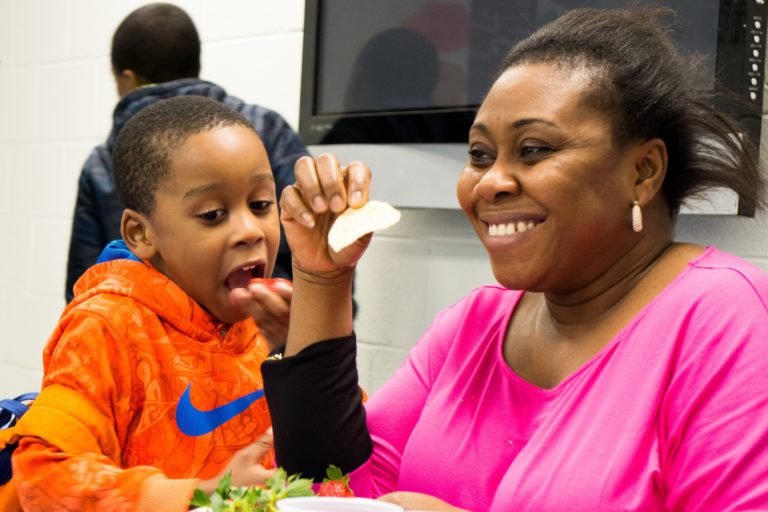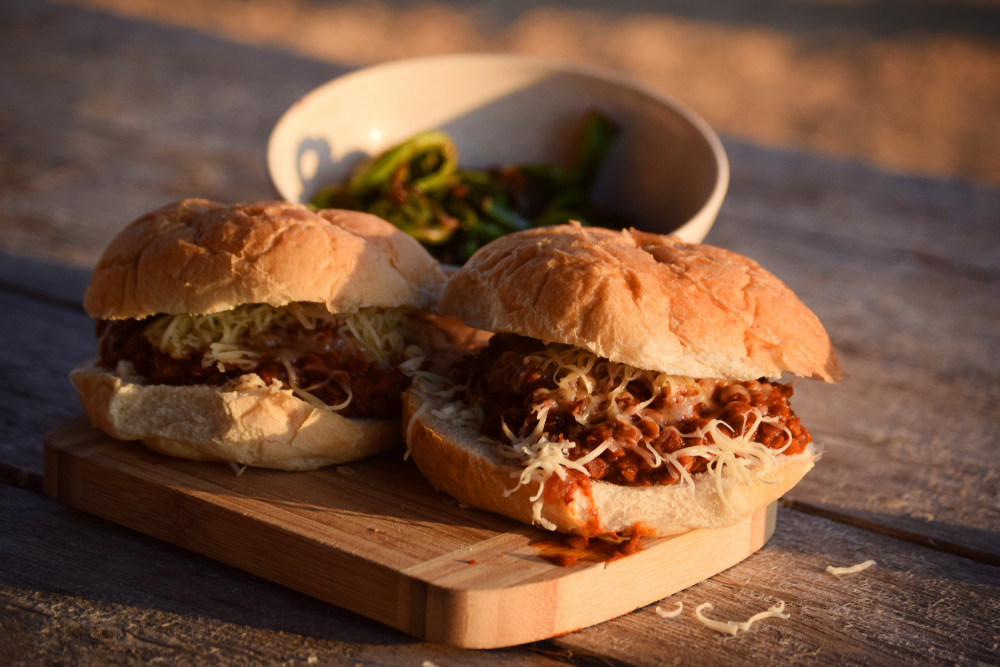New book from The Family Dinner Project inspires families with advice and stories from real families


The Family Dinner Project is a nonprofit initiative which encourages families to use family mealtime as an opportunity to connect through food, fun and conversation. Their ideas and expert advice inspire families to savor and enjoy time together through shared meals. Both The Family Dinner Project and Kids Cook Monday encourage families to cook and eat meals together.
Their new book, Eat, Laugh, Talk: The Family Dinner Playbook, was inspired by their work with thousands of families over the past 10 years. The book presents a lot of great ideas, tips and advice gained through this work over the years and provides families with the tools needed to have fun, enjoyable and delicious family dinners. The Washington Post and the New York Times have cited the book in articles about family dinners.
We spoke with Bri DeRosa at The Family Dinner Project to get her insights into getting families to enjoy mealtime and how to make time for family dinner among many competing priorities. We talked about how families can use Monday to the start the week with a healthy and enjoyable meal together, and heard some inspiring stories about families who have found ways to incorporate mealtime into of their busy lives.
Why is it important for children to be involved in cooking and preparing food?
There are a number of reasons why getting kids involved is a good idea– in fact, our book “Eat, Laugh, Talk: The Family Dinner Playbook” is organized around the most common challenges families face in gathering for shared meals, and how to overcome those challenges. Getting kids involved can help in almost every one of those areas. Here are some examples:
Picky Eating: Children who help to choose, prepare and cook food with their families are more likely to try those foods when they’re presented at the table. Giving them a sense of control over the food and pride in their work helps them to see new foods in a more positive light.
Too Much Work: For today’s busy families, cooking dinner can feel like just one more thing on the to-do list. When kids have been taught to be confident helpers in the kitchen, they can really pitch in to share some of that workload. Your young elementary school children can’t roast a chicken for you, but they can probably help make sandwiches and fruit. As confidence builds and kids grow, you can eventually ask teens to get dinner started for you, or even rotate responsibilities and let them take over the kitchen one or two nights a week. It’s a way of balancing the workload so family dinner doesn’t become the responsibility of just one adult.
Tension at the Table: Family mealtimes should be fun and relaxed. But too often, we hear from families that it’s the opposite: There’s tension at the table, and they can’t really enjoy each other’s company. This is where getting kids into food preparation can really help in unexpected ways. Some of the ideas we share in the book are to let kids choose menus with their favorites or themed menus like eating all one color palette for the night, or to let them get creative with making items like top-your-own pizzas, salad collages and yogurt parfaits at the table. Hands-on meals can make dinner into both an eating occasion and a built-in activity, which encourages more bonding and togetherness and reduces some of the stress families may feel.
Why are food, fun and conversation all important components of a family dinner?
Families tell us that food is what brings people to the table, but the fun and conversation are what make them stay there — and want to come back again and again! There are decades of research that show that family dinner has major benefits for the body, brain and spirit of all family members. However, in order to get most of those benefits, the mealtime experience has to be a pleasant one. Feeling connected to family members and sharing meaningful conversation and family fun at dinner can boost resilience, reduce stress, and lower the risk of anxiety, eating disorders, and substance use in kids. But the atmosphere has to be supportive, engaged and enjoyable, so all three ingredients — food, fun, and conversation — are important to ensure families get the most out of their family dinners.
Why is Monday a good day to cook and eat meals together?
We think any day is a good day to cook and eat meals together! But Mondays can be particularly powerful for some families, for a few reasons:
1. Mondays can be an inherently stressful day of the week. Let’s be honest: A lot of us wake up on Monday mornings and think “Ugh!” Having a positive family ritual on Monday evenings that we can look forward to takes a little bit of the sting out of starting a new week of work and school obligations. Family dinners can contribute to lower stress levels, so making it a priority to gather for food, fun and conversation can get the week started on a positive note.
2. Monday night cooking sessions can set up family meals for later in the week. It’s not always possible for families to take their precious weekend time to meal prep, no matter what Pinterest says! So if you can make dinner together on Monday night, you have an opportunity to store up some leftovers to reinvent later. Even something as simple as a pot of marinara sauce for spaghetti on Monday can become fast English muffin pizzas before Wednesday’s soccer practice, so try to make a habit of making a few extra portions on Mondays that will help you out when things get busy.
3. Mondays are a good day for a “temperature check.” We often tell parents that family dinner gives them a chance to check in and take kids’ emotional temperatures — you can really get a sense of how everyone is doing when you sit down face to face. If you can make a habit of gathering on Mondays, you catch everyone at the start of the week, when you can talk as a family about what the next several days are going to look like. Are there assignments or calendar events that need your attention? During the first day back to school after the weekend, were there any surprises (good or bad) that might be impacting a child’s mental health? It’s a great day to touch base and talk about how you’re all going to tackle the challenges and opportunities of the week.
What inspired you to put together Eat, Laugh, Talk: The Family Dinner Playbook?
After over a decade of working with thousands of families, we knew we had a lot of great ideas and resources to share. The greatest thing about this book, and the main reason we felt so strongly about writing it, is that it’s really crowdsourced wisdom. Each section of the book contains stories, tips and advice from real families who have come up with such smart, creative ways to solve common dinner challenges. Of course, we wanted to share plenty of recipes, conversation starters and games, and those are all in the book as well. But it’s the real family wisdom that makes “Eat, Laugh, Talk” special to us.
What have you learned from families you’ve worked with about helpful ways to make time in busy schedules for family dinner?
There are so many great tips about that in the book! One of our favorites is from a family with five boys ranging in age from 8 to 24. There’s just no realistic way for that whole family to all sit down together every night, so they instituted a rule: “No one eats alone.” They make meals that can withstand reheating and offer lots of serve-yourself sides like bread, cheese, fruit, nuts and sliced vegetables. They also use little tricks like a family joke jar that stays on the table so that people can sit down together and enjoy a fun dinner experience whenever there are a few family members ready to eat.
Other families in the book have different strategies, like packing picnic dinners to share on the go, or scheduling one non-negotiable dinnertime each week that stays on the family calendar. But we also want to highlight the fact that one of the most successful ways to have consistent family dinners is to throw the concept of “dinner” out the window as needed. Any opportunity to share food, fun and conversation can give you the benefits of a family dinner, so do what works for your schedule. A family breakfast, brunch or even regular snacktime can be just as effective if you’re tuned in to each other and really making the effort to connect.
Can you share a brief story from the book of a family you worked with who has overcome obstacles to having family dinners?
It’s so hard to pick just one! There are dozens of great stories in the book. But one that stands out to us is the story of Scott, a single dad who was trying to get his kids to sit down to have family dinners with him. They didn’t want to stop watching TV or playing video games long enough to eat, let alone talk to each other at the table. So Scott got creative. One night, he had the kids help him make ratatouille pasta, and they watched the Pixar movie “Ratatouille” while they ate. He got them involved in comparing their meal to the on-screen version, stopped the movie occasionally to ask questions, and really made it a fun shared viewing experience. That became a gateway to family dinners for him and his kids. Once they realized how much fun they could have together, they had more frequent family meals — both with and without screen time involved.
Do you have any other tips or insights to help families consistently make time for family dinner?
So many! But really, the most important thing we want to make sure families know is that it’s crucial to step back and let go of “perfect.” Often, the biggest obstacle to having regular family meals is the one that exists in our own minds. Families tell us that a “real” family dinner feels unattainable — they have visions in their heads of something perfect, with a June Cleaver kind of three-course meal and everyone using great table manners or kids who never fight and a kitchen that’s always clean. Most of us would fall short if we measured our dinners by that standard! It’s okay if dinner is scrambled eggs or cold sandwiches.It’s okay if there are spills or messes, or if you sometimes use paper plates, or whatever it is that feels “imperfect” to you. If you let go of the way you think things “should” be, you might find that it’s easier to find time to be together just as you are — and that’s the most important part.
Try The Family Dinner Project’s recipe for Lentil Sloppy Joes with your family next Monday!
